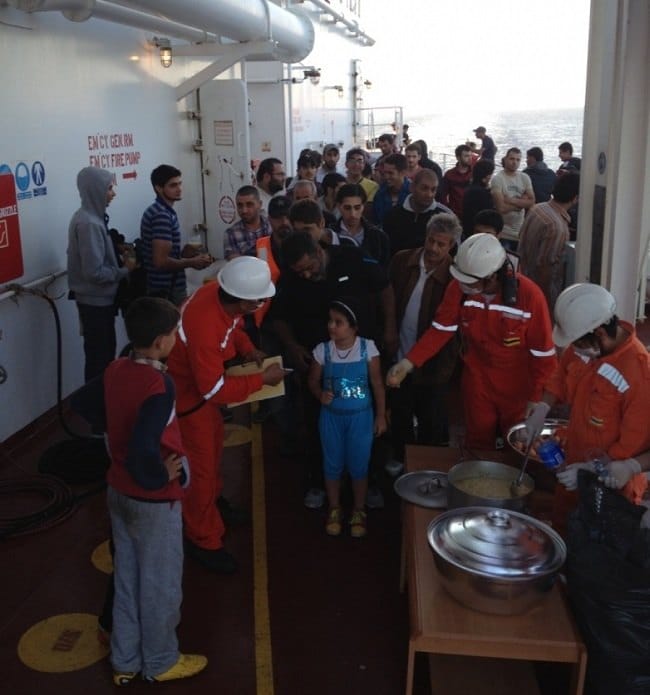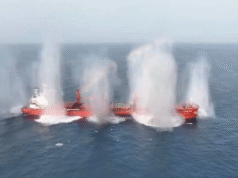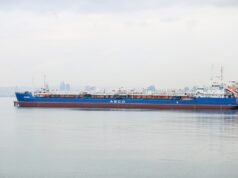Safety of Life at Sea has been endorsed since the very first day trade extended through the dimensions of shipping. Shipowner’s perspective about shipping as a profit making business is innate and has proved quite fruitful so far.
However, public welfare being a perpetual part of trade and associated humanitarian grounds aid to make trade more responsible. The means of inculcating this practice have been encouraged by providing legitimate immunity to seafarers in their actions gaining priority over commercial reasons while rescuing lives at sea.
The basic principles to be kept in mind while keeping a bridge lookout are safety of navigation, lookout for survivors or persons in distress and safety of the ship. The issue of saving lives at sea remains undisputed; however there were certain incidents which questioned levels of participation of Ships and Shipmasters .
Incident 1: Near the Gulf of Aden, a bulk carrier underway received a distress call from two boats on fire. The ship’s crew assumed that they were survivors and informed the MRCC. The vessel was directed upon to proceed for assistance and thus took the risk of going closer to the boats in High Risk Piracy area. On coming closer one of the crew members sighted arms in one of the boats. The vessel immediately diverted widely, informed MRCC and thus prudent action of master saved the vessel as it narrowly escaped a pirate attack.
Incident 2: After sailing out from Port Moresby, a chemical tanker received a distress call around 90 miles from the coast. The vessel was headed for Port Geelong, Australia. The vessel informed the Coastal state and was directed to proceed for assistance. A total of 57 survivors were rescued from a ferry which was about to sink. The vessel informed its flag state and the coastal state. It was directed to proceed towards Port Geelong and disembark the survivors and hand them over to the coastal authorities. While the vessel was 30 miles off the coast, during night 34 of the survivors jumped off the vessel into water and escaped in another boat waiting near the coast. The vessel informed the coastguard and was boarded by the authorities in Port of Geelong. Coastguard authorities unveiled an illegal immigration racket behind this incident. This was not once they had carried out such activities in coastal waters to facilitate illegal immigrants through sea going ships. On some incidents they were reported to carry hidden arms and weapons too.
This incident was an eye opener for various Coastal States and IMO wherein life of seafarers was endangered while they were complying with International Convention for Maritime Search and Rescue. Master, mate and other seafarers were directly involved with such survivors while providing food and other necessities onboard, mostly unaware of the intentions of such illegal immigrants. They even pose a threat to the safety of the ship and its crew. It jeopardised the valiant efforts and bravado exhibited by seafarers on numerous occasions to save lives at sea.

International Maritime Organisation (IMO) which functions as a legal body for regulating shipping industry, ensuring compliance with safety standards recommended the International Convention on Maritime Search and Rescue(IAMSAR), Annex 12 to Convention on International Civil Aviation, International Convention for Safety of Life at Sea(SOLAS ) Reg. V/33 makes it obligatory for shipmasters to assist others in distress at sea whenever they can safely do so.

Many states have accepted this obligation and established national SAR organisations to provide aeronautical and maritime SAR coordination and effective and economical SAR services on a 24 hours basis. A basic, practical, and humanitarian effect of having a global SAR system is that it eliminates the need for each state to provide SAR services for its own citizens wherever they travel world-wide. Instead, the globe Is divided into search and rescue regions (SRRs), each with a rescue co-ordination centre (RCC) and Associated SAR services, which assist anyone in distress within the SRR without regard to nationality or circumstances.
Unanimously, the rescue of survivors will be a prime objective whenever the situation arises, the illegitimate practices for migration can be diminished if coastal states play a bigger role in Search and Rescue. IMO has passed resolution FAL 11(37) regarding responsibilities of States, Masters Regarding Handling Stowaways. The resolution however does not specifically deals in cases where the purpose is of a planned and illegal migration in the disguise of survival. For e.g. Referring to incident no. 2 above the survivors could have been handed over or transferred from the vessel to Coastal authorities or coastguard Facilities in the Port of Departure itself i.e. Port Moresby. In certain cases after rescuing the survivors arrangements can be made to hand them over to the nearest coastal state rather than taking them to the port of destination or any other convenient port. Indefinite stay of stowaways, survivors onboard should be discouraged. The nearest costal states should have an obligatory role to arrange for speedy transfer and repatriation of survivors to their country once their nationality has been established .
If the situation permits, In coastal waters rescue operations should be led by the coastguard vessels and eventually survivors should be embarked upon their vessels or other facilities. However in high seas where circumstances are adverse merchant ships would continue to be the most reliable and appropriate mean to save lives.
Steps are being taken to address the growing concern of migrants and the lives being lost at sea. Recently, International Chamber of Shipping (ICS) came up with guidelines for large scale rescue operations at the sea. However, it spite of all the guidelines and legal obligations, it would always be a tough decision to make for seafarers when it comes to rescuing migrants at sea.
Over to you?
As a seafarer, what are your views on saving lives (especially those of migrants) at the sea.
Let’s know in the comments below or start a discussion at forums.marineinsight.com







